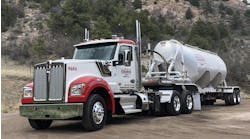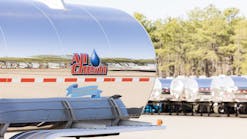The House Transportation and Infrastructure Committee last week approved a slate of measures designed to strengthen the nation’s supply chain and protect against future disruptions, including the Dry Bulk Weight Tolerance Act, which addresses a long-held National Tank Truck Carriers priority.
H.R. 3318, if signed into law, would provide a 10% axle weight variance for dry bulk commodities.
The bipartisan legislation is one of four bills introduced May 17 by Rep. Rick Crawford, an Arkansas Republican. Recognizing that dry bulk commodities like grains and plastics can shift during transport, causing unintended weight distributions across the vehicle’s axles, the goal is to allow axles to weigh up to 10% more, without increasing federally mandated gross vehicle weight limits, NTTC said in a news release.
“NTTC congratulates Rep. Rick Crawford (R-Ark.) and Rep. Salud Carbajal (D-Calif.) for their success as bill sponsors,” the association said. “NTTC also thanks its members, who initiated and responded quickly to a grassroots outreach effort to their Congressmen, for communicating the benefits of a 10% axle variance, including lower consumer costs, higher operational efficiency, lower emissions, and improved infrastructure preservation—all without compromising safety.”
The committee said the bill’s axle-weight allowance will ensure trucks don’t have to unnecessarily reduce their loads.
“Commodities such as flour or rice have the tendency to shift when the driver comes to a stop, even when packaged properly,” Crawford stated. “Current law doesn’t take into account that this movement is inevitable. This legislation is a commonsense solution for truckers transporting dry bulk by giving more flexibility for weight per axle requirements.”
American Trucking Associations also applauded the bill’s approval, along with four other trucking bills approved by the House committee that ATA maintains will bolster the nation’s supply chain, including the Truck Parking Safety Improvement Act, Licensing Individual Commercial Exam-takers Now Safely and Efficiently (LICENSE) Act, Carrying Automobiles Responsibly and Safely (CARS) Act, and H.R. 3447, which would provide a 2,000-pound weight exemption for hydrogen-powered vehicles similar to the one enjoyed by battery-electric and natural gas-powered trucks.
“The comprehensive and bipartisan bills that advanced [May 23] would address some of the root causes of ongoing supply chain challenges and improve the overall safety, efficiency, and resiliency of freight transportation,” Chris Spear, ATA president and CEO, said in a release. “ATA has repeatedly engaged with Congress to discuss persistent challenges facing our industry, and we thank Chairman [Sam] Graves for his attention to these issues and for his leadership of today’s markup.
“We also commend the bill sponsors who worked with us and other key stakeholders to craft solutions that would benefit our industry, the economy, and American consumers.”
Additional measures passed by the committee include:
- H.R. 3365, the Supply Chain Improvement Act
- H.R. 1500, the Intelligent Transportation Integration Act
- H.R. 915, the Motor Carrier Safety Selection Standard Act
- H.R. 3317, the Rolling Stock Protection Act
- H.R. 3372, establishing a safety data collection program for certain 6-axle vehicles
- H.R. 3395, the U.S. Supply Chain Security Review Act of 2023









